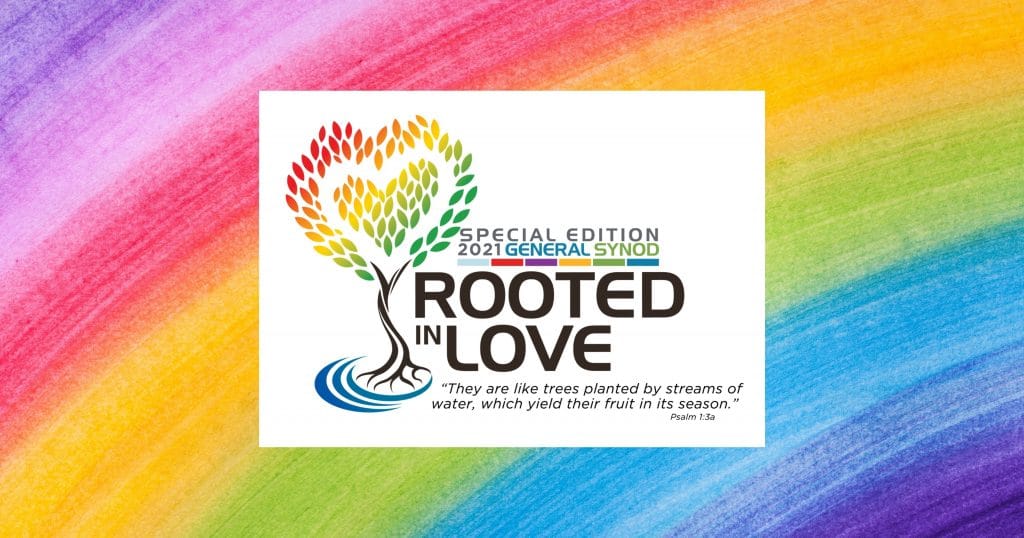Advocates ask Synod to back ban on conversion therapy and its ‘demonstrable harm’
The 2021 General Synod of the United Church of Christ, meeting July 11-18, will consider 11 resolutions and several bylaw changes. This is one in a series of articles about them. Readers can view an initial summary here and find full texts at the Synod website.
In rural Wyoming, families sent their queer kids to a church on Saturday mornings. There, local pastors took turns telling them that God was not pleased with them.
Kimi Floyd Reisch was one of them. Reisch is now on the staff of the United Church of Christ Open and Affirming Coalition and uses they/them pronouns. But then, they were growing up bisexual — in a fundamentalist Lutheran family and church — without any support in sight.
Back then, being told you were sinful every Saturday wasn’t called conversion therapy. But that’s what it amounted to, Reisch said.

And that practice — still widely legal in the U.S., under medical guise — is what the UCC General Synod is being asked to oppose.
The Coalition and the UCC Mental Health Network have submitted a proposed “Resolution to Ban the Practice of Conversion Therapy.” A committee of delegates will review it, starting July 15. To pass, it will need a two-thirds vote of delegates in a Synod plenary session between then and July 18.
Legal in 50 states
The resolution notes that the medical practice of “conversion” or “reparative” therapy on adults is legal in all 50 states. Thirty states allow it for youth and children. The goal of the practice is “to change or ‘repair’ the sexual orientation or gender identity of LGBTQ+ persons in the belief that their orientation or identity is a mental illness.”
People who practice the therapy believe LGBTQ+ orientation or identity “is a disease, defect or developmental disorder,” the resolution’s background section says. “This claim has been repudiated by every professional association in the field of health care.”
Many professional associations have urged a ban on conversion therapy. The UCC resolution, if adopted, would ask the entire church to join in that call.
Moreover, it would urge everyone in the church “to strengthen their efforts to reach their LGBTQ+ neighbors, especially youth, with the Good News that their sexual orientation or gender identity or expression are gifts from God.”
‘I tried to end my life’
Lives are at stake, according to statistics quoted in the resolution. It cites a 2020 study showing that people subjected to conversion therapy have “a greater risk of suicidal thoughts and attempted suicide than LGBTQ+ people who had never experienced this therapy.”
“It sets a person up to think that they have to give up their orientation or gender identity to be a person of faith.”
Kimi Floyd Reisch, ONA Program Minister, UCC Open and Affirming Coalition
Again, Reisch was one of them. “At 16, I tried to end my life,” they said. “It was a serious attempt. I spent over a week in the hospital. But when I left the hospital, because my parents are conservative, they flat out refused to let me see a regular therapist or other practitioner. They sent me back to church for therapy. I went back into the closet for another 20 years.”
Today, teens and adults may be sent to conversion therapy as residential treatment, at a camp, or one-on-one with a pastor or other practitioner, Reisch said. And because families and churches work together, youth and adults who experience conversion therapy are stuck in “a whole system.” “It sets a person up to think that they have to give up their orientation or gender identity to be a person of faith,” they said. “It takes scripture, even the most beautiful parts of scripture – love God and love each other — and twists them into a version where God cannot love you unless you change.”
‘No place to go’
Reisch eventually refused conversion therapy, owned their identity as “a bisexual, two-spirit person” — and was disowned by their parents and other family members. But Reisch also eventually found a spiritual home in the UCC.
“When you are in those small towns, there is no place to go.”
Kimi Floyd Reisch
For a seminary project toward their D.Min. degree, Reisch is collecting similar stories from “people in isolated areas.” They said that many of those subjects, now in their 40s and 50s, still feel trauma and stigma from the conversion attempts they faced as teens. They, like Reisch, had nowhere local to turn. “When you are in Sheridan, Wyo., it is two hours to a shopping mall,” Reisch said. “When you are in those small towns, there is no place to go.”
So, they said, when churches like the UCC speak out — nationally, or even by becoming the only ONA congregation in an entire region — it can be “a lifeline” to people who are under conversion pressure, whether or not they are able at the moment to walk away from it.
‘Mental health justice’
The UCC added another such national proclamation in May, when the Mental Health Network formally declared itself ONA.
“We discussed the harm carried out in the name of ‘mental health’ and we wanted to name the harm and apologize for it,” said the Rev. Sarah Lund, a past Network board member who is now its national staff liaison. The proposed Synod resolution and the Network’s own declaration reflect “our commitment to seek mental health justice,” she said. Part of that — as the Network’s new ONA covenant puts it — is “fighting against continued efforts … to weaponize scripture and medical terminology.”
This summer’s resolution, if adopted as written, would say that the Synod “deplores the practice of ‘conversion therapy’ or ‘reparative therapy’ that denies LGBTQ+ youth and adults the opportunity to experience the blessings of love and human integrity.” It would also urge:
- UCC “parents, authorized ministers and care-givers” to “protect those in their care from any practice or program that purports to ‘cure’ their sexual orientation or gender identity.”
- All settings of the church to advocate “state and federal laws protecting adults, youth and children from ‘conversion therapy’ by banning the practice.”
Reasons to hope
Despite efforts to the contrary — including current attempts in 33 states to ban some kinds of medical care for trans youth — there are reasons to hope, Reisch said. “A couple states have promoted conversion therapy bans in a the last year or two,” they said. “Michigan is trying to ban it for minors right now.” The United Nations’ Free and Equal initiative and the Global Interfaith Commission on LGBTQ+ Lives are examples of international support.
Even Sheridan has an ONA church now: First Congregational UCC was certified on May 27, Reisch said.
And if the UCC resolution emboldens more churches — whether ONA or not — to work to ban conversion therapy, it could be a beacon of hope to people struggling in spiritual isolation, they said. “My hope is that no person will feel like coming out of the closet will mean they cannot be a person of faith.”
[This article was updated on June 22, 2021, to indicate that a committee of delegates will begin considering the resolution on July 15. A previous version said July 16.]
Related News
A Prophetic Call for Justice and Peace in Palestine
The executive leaders of the United Church of Christ have issued the following statement...
Read More‘Love is Greater Than Fear’: Regional Youth Events get to the heart of gospel message
United Church of Christ teens attending this summer’s Regional Youth Events (RYE) are...
Read MoreUCC desk calendars available to order now
Prepare for your day, month and year with the United Church of Christ desk calendar —...
Read More


